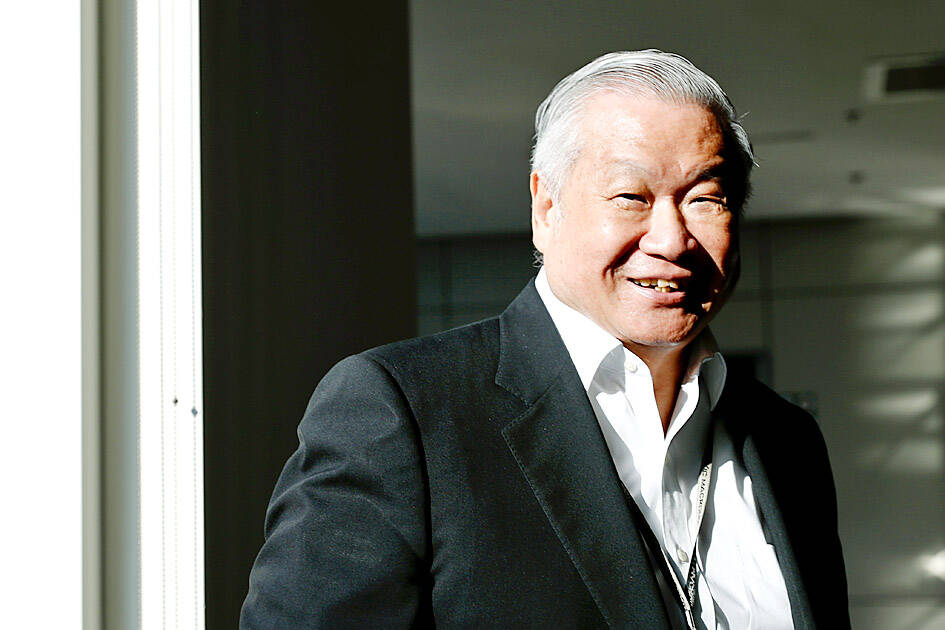Macronix International Co (旺宏), the world’s biggest supplier of NOR flash memory chips, yesterday said it did not expect the memorychip industry to pick up significantly in the first half of next year as a weak global economy — China in particular — and rising inflation have dampened consumers’ appetite for electronics.
In Europe, the economy is battling high inflation caused by Russia’s war in Ukraine, while the US-China technology dispute has dealt a blow to China’s manufacturing sector and consumer spending, Macronix said.
As the global economic recovery remains in limbo, it would take much longer to see a dramatic reduction in the supply chain’s excess inventory, caused by a boom in market demand two years ago, Macronix chairman and CEO Miin Wu (吳敏求) said.

Photo: Ritchie B. Tongo, EPA-EFE
The company has seen a dip in revenue contributions from China due to weak demand, Wu said, adding that some Taiwanese manufacturers have also allocated capacity away from China.
“I just cannot find any reason to convince myself that next year will be a better year,” Wu said. “There could be a chance of a recovery in the second half of next year, if there is any improvement at all.”
Wu said he expects a lukewarm recovery in the first half of next year, and that NOR flash memory chips used in vehicles, and industrial and medical devices would be major pillars supporting the business.
“The automotive, industrial and medical segments are relatively stable, when half of our businesses are declining,” Wu said, adding that vehicles nowadays are equipped with a growing number of microcontrollers, which use NOR flash memory chips.
NOR flash memory chips made up about 46 percent of the company’s revenue in the second quarter, Macronix said.
The company reported a net profit of NT$71 million (US$2.2 million) in the second quarter, following a net loss of NT$355 million in the first quarter.
Commenting on China’s advancements in semiconductor manufacturing, Wu said Huawei Technologies Co (華為) has demonstrated to the world that it is capable of making advanced application processors without access to US technology, as its latest Mate 60 Pro smartphone is equipped with a 7-nanometer processor.
High costs and an unsatisfactory yield would not be an issue given the company’s support from the Chinese government, he said.
However, Huawei still lags far behind global chipmakers and it would take up to 20 years to catch up, Wu said, adding that developing semiconductor equipment might be the key to help it advance its technology faster.

SEEKING CLARITY: Washington should not adopt measures that create uncertainties for ‘existing semiconductor investments,’ TSMC said referring to its US$165 billion in the US Taiwan Semiconductor Manufacturing Co (TSMC, 台積電) told the US that any future tariffs on Taiwanese semiconductors could reduce demand for chips and derail its pledge to increase its investment in Arizona. “New import restrictions could jeopardize current US leadership in the competitive technology industry and create uncertainties for many committed semiconductor capital projects in the US, including TSMC Arizona’s significant investment plan in Phoenix,” the chipmaker wrote in a letter to the US Department of Commerce. TSMC issued the warning in response to a solicitation for comments by the department on a possible tariff on semiconductor imports by US President Donald Trump’s

The government has launched a three-pronged strategy to attract local and international talent, aiming to position Taiwan as a new global hub following Nvidia Corp’s announcement that it has chosen Taipei as the site of its Taiwan headquarters. Nvidia cofounder and CEO Jensen Huang (黃仁勳) on Monday last week announced during his keynote speech at the Computex trade show in Taipei that the Nvidia Constellation, the company’s planned Taiwan headquarters, would be located in the Beitou-Shilin Technology Park (北投士林科技園區) in Taipei. Huang’s decision to establish a base in Taiwan is “primarily due to Taiwan’s talent pool and its strength in the semiconductor

An earnings report from semiconductor giant and artificial intelligence (AI) bellwether Nvidia Corp takes center stage for Wall Street this week, as stocks hit a speed bump of worries over US federal deficits driving up Treasury yields. US equities pulled back last week after a torrid rally, as investors turned their attention to tax and spending legislation poised to swell the US government’s US$36 trillion in debt. Long-dated US Treasury yields rose amid the fiscal worries, with the 30-year yield topping 5 percent and hitting its highest level since late 2023. Stocks were dealt another blow on Friday when US President Donald

UNCERTAINTY: Investors remain worried that trade negotiations with Washington could go poorly, given Trump’s inconsistency on tariffs in his second term, experts said The consumer confidence index this month fell for a ninth consecutive month to its lowest level in 13 months, as global trade uncertainties and tariff risks cloud Taiwan’s economic outlook, a survey released yesterday by National Central University found. The biggest decline came from the timing for stock investments, which plunged 11.82 points to 26.82, underscoring bleak investor confidence, it said. “Although the TAIEX reclaimed the 21,000-point mark after the US and China agreed to bury the hatchet for 90 days, investors remain worried that the situation would turn sour later,” said Dachrahn Wu (吳大任), director of the university’s Research Center for